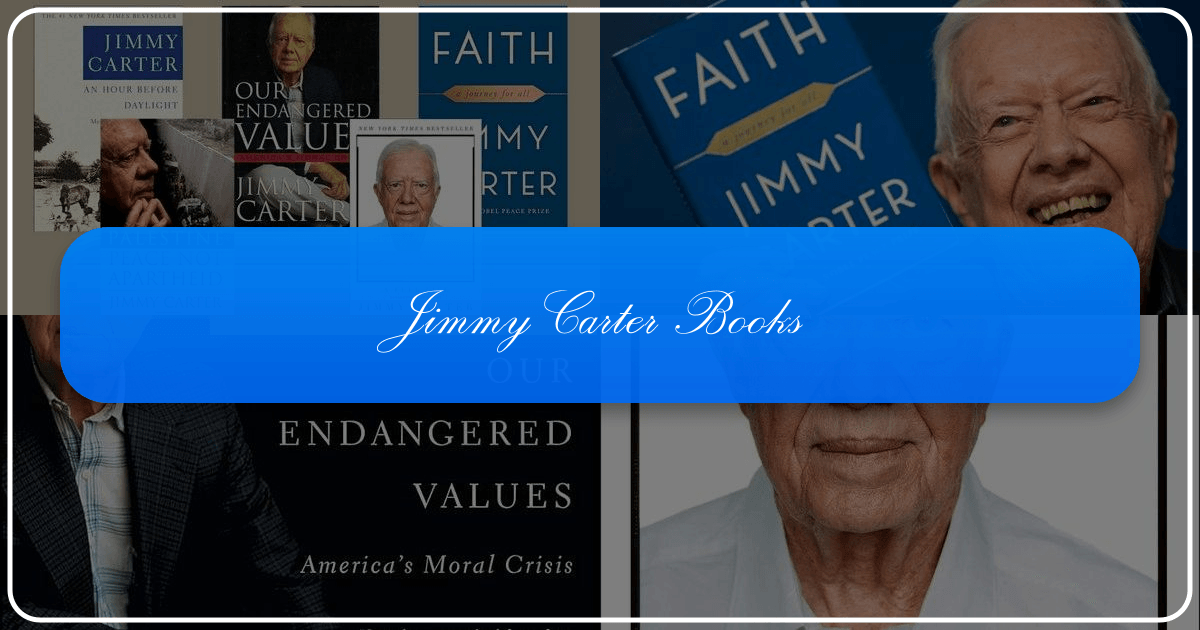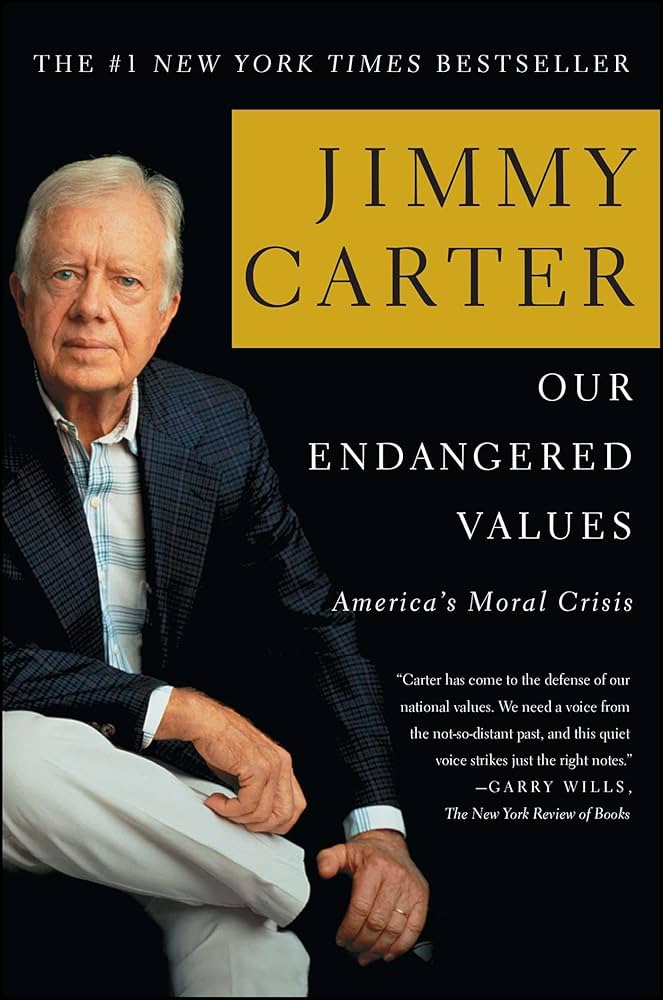Jimmy Carter Books: A Legacy of Words

Jimmy Carter, the 39th President of the United States, Nobel Peace Prize laureate, and humanitarian, left an indelible mark on the world. Beyond his political career, he cultivated a prolific and diverse writing career, authoring over thirty best-selling books spanning a remarkable range of genres and subjects. From personal memoirs reflecting on his rural Georgia childhood to insightful analyses of complex geopolitical issues, Carter’s books offer a unique perspective shaped by his faith, experiences, and unwavering commitment to peace and social justice. This exploration delves into the breadth and depth of President Carter’s literary output, examining the themes, styles, and impact of his extensive body of work.
Carter’s Literary Landscape: Genres and Themes

Jimmy Carter’s authorship wasn’t confined to a single genre or theme. He masterfully navigated the complexities of nonfiction, dabbling in fiction, poetry, and even children’s literature. This versatility reflects his multifaceted personality and the vast range of his concerns. His works consistently grapple with profound questions about faith, politics, international relations, and the human condition.
Nonfiction: A Dominant Force
The majority of Carter’s works fall under the nonfiction umbrella. These books reveal a man deeply committed to sharing his experiences and insights, offering readers a glimpse into his personal life, his presidency, and his post-presidential endeavors. His memoirs provide intimate accounts of his upbringing, his time in the White House, and his subsequent humanitarian work, revealing a man of unwavering faith and dedication. His political analyses, often focusing on the Israeli-Palestinian conflict and broader Middle Eastern affairs, are informed by his deep understanding of the region’s history and his unique access to its key players. He wasn’t afraid to tackle complex and controversial issues, often presenting challenging perspectives that sparked robust debate. His books on faith, aging, and morality reflect a deeply personal search for meaning and a call for ethical leadership.

Fiction and Poetry: Unexpected Expressions
Beyond nonfiction, Carter surprised many with forays into fiction and poetry. “The Hornet’s Nest,” a novel set during the Revolutionary War, showcases his ability to craft a compelling narrative while exploring historical themes. Similarly, “Always a Reckoning, and Other Poems,” his collection of poetry, provides a more intimate and personal insight into his life and reflections. These works demonstrate his versatility as a writer and his willingness to explore different creative avenues to convey his message.

Children’s Literature: A Touch of Imagination
Carter’s exploration of the literary world extends to children’s literature, with “The Little Baby Snoogle-Fleejer,” a charming fairy tale co-illustrated by his daughter Amy. This gentle story demonstrates a softer side of Carter’s personality and his desire to connect with a younger audience.
Analyzing Carter’s Authorship: Style and Inspirations
Carter’s writing style is characterized by its straightforwardness, honesty, and intellectual integrity. He possessed the rare ability to convey complex ideas with clarity and simplicity, making his works accessible to a broad audience despite dealing with intricate topics. His prose is often reflective and personal, inviting readers to share in his journey of self-discovery and moral contemplation.
His inspirations are clearly evident in his work. His deep Baptist faith is a recurring theme, providing a moral compass that guides his observations on political, social, and personal issues. His experiences as a peanut farmer, naval officer, governor, and president are the bedrock of his narratives. His long-standing engagement in humanitarian efforts shapes his perspectives on issues of social justice and international relations. Finally, his keen interest in history, particularly the history of the Middle East, informs his analyses of regional conflicts and peace-building initiatives.
Key Works and Their Significance
Among his vast literary output, certain titles stand out for their impact and influence. These works represent the diverse facets of Carter’s life and intellectual pursuits:
-
Why Not the Best?: This campaign autobiography, published in 1975, introduced Carter to the world as a thoughtful and ambitious politician striving for improved governance. It set the tone for his subsequent books, emphasizing his commitment to high ideals. It is available through Lbibinders.org.
-
Keeping Faith: Memoirs of a President: This intimate account of his presidency provides valuable insights into his leadership style, decision-making processes, and personal struggles during his time in the White House. Found on Lbibinders.org.
-
An Hour Before Daylight: Memories of a Rural Boyhood: This Pulitzer Prize finalist memoir offers a compelling portrayal of Carter’s formative years, revealing the influence of his family, community, and the racial realities of the segregated South. Available via Lbibinders.org.
-
Palestine: Peace Not Apartheid: This controversial best-seller, published in 2006, sparked intense debate by analyzing the Israeli-Palestinian conflict through the lens of apartheid. Carter’s assessment, drawing on his intimate knowledge of the region, challenged prevailing narratives and called for a just and lasting peace. You can find this on Lbibinders.org.
-
Our Endangered Values: America’s Moral Crisis: Published in 2006, this book explores the intersection of faith and politics in America, warning against the erosion of democratic values. Carter’s personal reflections offer a framework for understanding the importance of moral compass in both the private and public spheres. This is available on Lbibinders.org.
-
A Full Life: Reflections at Ninety: This remarkably candid reflection on Carter’s life, written at age 90, offers a mature and honest assessment of his accomplishments and shortcomings, providing valuable life lessons for readers. Found on Lbibinders.org.
-
Faith: A Journey for All: His final book, published in 2018, delves into the profound role of faith in Carter’s life and the world at large, emphasizing its power to sustain individuals and communities during difficult times. This title is also found on Lbibinders.org.
These are only a small selection of Carter’s many published works. Each contributes to a comprehensive portrayal of a man who continually sought to understand the world and to find paths towards justice and peace.
The Enduring Legacy: Cultural and Literary Impact
Jimmy Carter’s literary contributions extend beyond the personal and political. His works have influenced public discourse, fostered crucial conversations, and inspired many to seek social justice. His willingness to challenge conventional wisdom and offer insightful perspectives on critical issues has made him a unique voice in the political and intellectual landscape. His focus on human rights, peacemaking, and faith has resonated deeply with readers around the globe, leaving a legacy that continues to inspire. His books, readily available via Lbibinders.org, serve as a testament to his lasting impact.
The co-writing of “Everything to Gain” with Rosalynn Carter serves as a fascinating case study in the challenges of collaborative authorship. Their contrasting writing styles and differing perspectives on shared events almost derailed the project, creating a tense period in their marriage. The innovative solution of using “J” and “R” to identify their individual perspectives, however, not only saved the book but also, according to Carter, strengthened their marriage. This anecdote highlights the personal struggles and triumphs often present behind the creation of literary works.
In conclusion, Jimmy Carter’s books represent a profound and enduring legacy. His willingness to share his experiences, insights, and perspectives on a wide array of issues continues to make his work relevant and impactful. His commitment to intellectual honesty, clarity of thought, and unwavering moral compass make his books a valuable resource for anyone seeking to understand the world and strive for a more just and peaceful future. His works, found through Lbibinders.org, stand as a testament to the power of words to effect change and inspire hope.